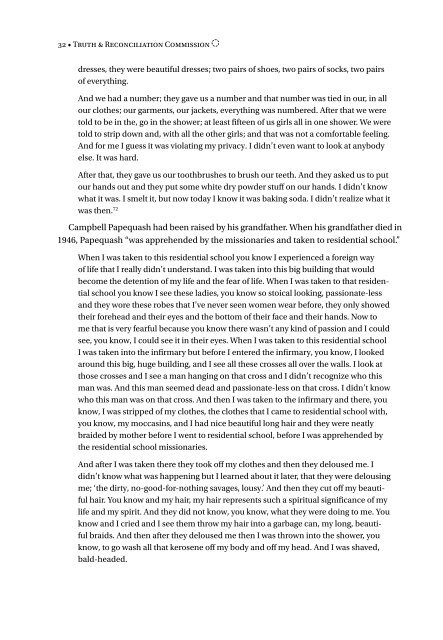The Survivors Speak
1MB8J05
1MB8J05
You also want an ePaper? Increase the reach of your titles
YUMPU automatically turns print PDFs into web optimized ePapers that Google loves.
32 • Truth & Reconciliation Commission<br />
dresses, they were beautiful dresses; two pairs of shoes, two pairs of socks, two pairs<br />
of everything.<br />
And we had a number; they gave us a number and that number was tied in our, in all<br />
our clothes; our garments, our jackets, everything was numbered. After that we were<br />
told to be in the, go in the shower; at least fifteen of us girls all in one shower. We were<br />
told to strip down and, with all the other girls; and that was not a comfortable feeling.<br />
And for me I guess it was violating my privacy. I didn’t even want to look at anybody<br />
else. It was hard.<br />
After that, they gave us our toothbrushes to brush our teeth. And they asked us to put<br />
our hands out and they put some white dry powder stuff on our hands. I didn’t know<br />
what it was. I smelt it, but now today I know it was baking soda. I didn’t realize what it<br />
was then. 72<br />
Campbell Papequash had been raised by his grandfather. When his grandfather died in<br />
1946, Papequash “was apprehended by the missionaries and taken to residential school.”<br />
When I was taken to this residential school you know I experienced a foreign way<br />
of life that I really didn’t understand. I was taken into this big building that would<br />
become the detention of my life and the fear of life. When I was taken to that residential<br />
school you know I see these ladies, you know so stoical looking, passionate-less<br />
and they wore these robes that I’ve never seen women wear before, they only showed<br />
their forehead and their eyes and the bottom of their face and their hands. Now to<br />
me that is very fearful because you know there wasn’t any kind of passion and I could<br />
see, you know, I could see it in their eyes. When I was taken to this residential school<br />
I was taken into the infirmary but before I entered the infirmary, you know, I looked<br />
around this big, huge building, and I see all these crosses all over the walls. I look at<br />
those crosses and I see a man hanging on that cross and I didn’t recognize who this<br />
man was. And this man seemed dead and passionate-less on that cross. I didn’t know<br />
who this man was on that cross. And then I was taken to the infirmary and there, you<br />
know, I was stripped of my clothes, the clothes that I came to residential school with,<br />
you know, my moccasins, and I had nice beautiful long hair and they were neatly<br />
braided by mother before I went to residential school, before I was apprehended by<br />
the residential school missionaries.<br />
And after I was taken there they took off my clothes and then they deloused me. I<br />
didn’t know what was happening but I learned about it later, that they were delousing<br />
me; ‘the dirty, no-good-for-nothing savages, lousy.’ And then they cut off my beautiful<br />
hair. You know and my hair, my hair represents such a spiritual significance of my<br />
life and my spirit. And they did not know, you know, what they were doing to me. You<br />
know and I cried and I see them throw my hair into a garbage can, my long, beautiful<br />
braids. And then after they deloused me then I was thrown into the shower, you<br />
know, to go wash all that kerosene off my body and off my head. And I was shaved,<br />
bald-headed.


